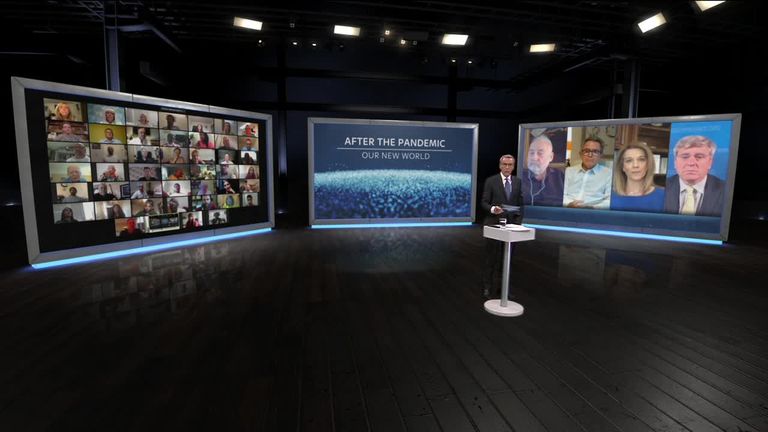Coronavirus: Are political decisions starting to outweigh scientific ones?
With each lockdown change, the debate over whether the government is moving too quickly, or not quickly enough, evolves with it.
Monday 8 June 2020 07:52, UK
With each week that passes, the so-called "new normal" evolves again.
Today it's the introduction of 14-day quarantine at the border. Next week it's likely to be the reopening of shops that had been deemed non-essential.
But as each change is made or mooted, the debate over whether the government is moving too quickly, or not quickly enough, evolves with it.
A few weeks ago the narrative was of Boris Johnson's apparent volte-face - the "hawk" prime minister who had been reluctant to impose a lockdown, transformed by his personal experience in hospital to become a "dove" convinced both of its efficacy and on-going necessity.
Now it appears to have changed again, with The Sunday Times reporting that the prospect of 3.5 million imminent job losses in the hospitality sector has prompted the Mr Johnson to order a faster lifting of restrictions on pubs and restaurants.
Asked by Sky's Sophy Ridge whether this account was accurate, the health secretary was insistent the government's approach was not being buffeted by a change of priorities.
"The plan and the strategy hasn't changed," Matt Hancock responded.
"We've got a clear plan and we're working through that plan... and of course, always, always doing that with safety front of mind, cautiously progressing."
But if the strategy has not changed, the context certainly has.
The government's critics have seized upon what they see as the gaps between what ministers had said would be required for measures to be relaxed, and the current reality.
Weeks ago an effective test and trace system, complimented by a dedicated NHSX tracking app, was presented as the means by which restrictions could be eased safely.
While the test and trace system has now been formally launched and "thousands" of people have been contacted, no data has yet been published to demonstrate whether it is working effectively.
Neither has any evidence been set out from the Isle of Wight pilot to explain why ministers judged that the scheme was ready for a national roll-out.
Then there's the issue of the coronavirus alert level.
:: Listen to the All Out Politics podcast on , , ,
In an address on 10 May, the prime minister suggested the shift from level four to three, set by the newly formed Joint Biosecurity Centre, would be at the heart of determining when relaxations were implemented.
"If the alert level won't allow it, we will simply wait and go on until we have got it right," Mr Johnson said.
Although ministers stress that the direction of travel is downward, for now the alert level remains at four - meaning the virus is still in general circulation and there is a high or rising level of transmission.
The government's defence for moving forward with the relaxations is that they have nonetheless satisfied the five tests previously set, which included ensuring the NHS would not be overwhelmed, and seeing a consistent fall in the number of deaths and new cases.
But in his interview on Sky News, Mr Hancock also acknowledged this was an example of a decision based not just on the specifics of the science, but the politics of the pandemic.
"They advise us and we as ministers, democratically elected, make the decisions. That's how it works and the level is clearly moving from four to three and the reason for that is because we can see that the number of new infections is coming down."
That response indicates that even if the government's strategy hasn't changed, the extent to which it is conditionally dependent on the scientists' advice clearly has.
It's the kind of shift which makes far more plausible the idea that the two-metre social distancing rule could be reduced in future, despite advice to the contrary from the government's scientific advisers.
Indeed if the headline statistics continue to show the rate of daily deaths, hospital admissions and new cases lowering, ministers may well become more confident in justifying the apparent evolution in their approach.
But that also means the gradual shift from the "new normal" to something more akin to the old has become far more dependent on the ministerial interpretation of the balance between public health and the economy.
The distinction between the decision-makers and the advisers has always existed, but it is now more pronounced than at any other point in this crisis, as is the degree of responsibility each will ultimately hold.









